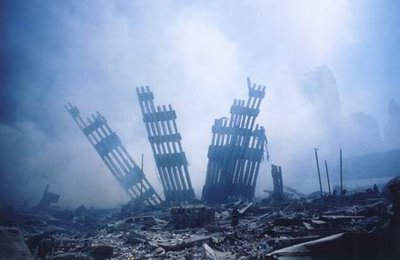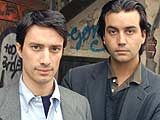9/11: The Way We Were
 Back in March, Maggie made a post about the film Loose Change, generating much discussion, both online and off. At the time, I argued that the film was sloppy and propagandistic -- and as such, a contribution to the dumbing down of American political discourse. A month or so ago, my roommate introduced me to another 9/11 film (approriately titled 9/11), which I would like to offer as an alternative to Loose Change.
Back in March, Maggie made a post about the film Loose Change, generating much discussion, both online and off. At the time, I argued that the film was sloppy and propagandistic -- and as such, a contribution to the dumbing down of American political discourse. A month or so ago, my roommate introduced me to another 9/11 film (approriately titled 9/11), which I would like to offer as an alternative to Loose Change.In the months before September 11th, two French filmmakers, brothers Jules and Gédéon Naudet, came to
 Unlike Loose Change (as well other documentaries such as Fahrenheit 9/11 and Why We Fight) 9/11 is not propagandistic. Nor does it turn its subject matter into a melodrama as have some fictional films on the subject. Unlike the former films, it is a documentary in the sense that it actually documents, to a large extent, what it was like to be a firemen inside the towers, as well as in the time before and after the crash.
Unlike Loose Change (as well other documentaries such as Fahrenheit 9/11 and Why We Fight) 9/11 is not propagandistic. Nor does it turn its subject matter into a melodrama as have some fictional films on the subject. Unlike the former films, it is a documentary in the sense that it actually documents, to a large extent, what it was like to be a firemen inside the towers, as well as in the time before and after the crash.
Watching 9/11, one remembers how unprecedented the event was which it depicts – something easy to forget after five years of having it abstracted and hammered into our political subconscious. As a film, it is deceptively simple: it seems to be little more than the Naudet brothers’ footage skillfully edited and honestly narrated. But as one watches, it quickly becomes clear how much has changed in the five intervening years since it was shot. Today, the firefighters' can-do attitude seems like innocence almost unimaginable in a world of terrorist threat levels and electronic surveillance. When the firemen close off one of the exits of Tower One or put labels on the front desk “just to make it obvious to people” which tower they are in, it seems almost naïve. Today, even when the subway stops for 10 minutes to wait for clearance it’s hard not to have a moment of panic.
 It almost seems appropriate then, when during the break (in the TV version), we are treated to mini-lecture from
It almost seems appropriate then, when during the break (in the TV version), we are treated to mini-lecture from
Although it is a bit long and at moments heart-wrenching to watch, 9/11 is definitely worth seeing even if only to remind us of the way we were. It received very little press in the US (or at least little that I can remember, and certainly little in comparison to Fahrenheit 9/11) which I find surprising since it is by far the best contemporary documentary I have seen in a while. It is available here from google video with French narration and here as it was aired on ABC.

7 Comments:
Very interesting post. Isn't the documentary genre almost coded as propaganda from the start? But I get what you're saying, and am eager and curious to view the film. It would be nice if our political discourse could narrate 9/11 as something other than either fodder for stirring up anxiety about terrorism or as fodder for criticizing others who use it to stir up anxiety about terrorism.
I definitely don't think that documentaries are inherently propagandistic, or at least not any more than any other genre of film. There does seem to be a definite trend towards politicization these days, but think of docs like Grizzly Man, Fog of War, Paris is Burning, Buena Vista Social Club, Spellbound, Control Room, etc. I wouldn't call any of those propagandistic.
It seems like since 9/11, political discourse has become more and more polarized and this has carried over into cinema. I find it really too bad that this film received so little publicity, but I guess when it is caught in the middle of a shouting match between Michael Moore and Fox News that should come as no surprise. But yeah, I agree with you that it's too bad our narration of 9/11 only seems to get noticed when it falls along partisan lines.
Maybe propagandistic is too strong a word... but, the doc genre does have that dangerous reality status. I mean, doesn't Spellbound, for example, inadvertently suggest the argument that little white suburban kids make the best spellers? Whatever happened to the good old days of cinema verite? I miss documentaries that can at least be self-disruptive.
You make a good point, Maggie, that the "reality status" of documentaries makes them more problematic than fiction films. But I think the problem is with how we define reality and not actually with the idea of documentary filmmaking.
I'm sure we have all learned in our respective "leftist jihad" institutions, that the very act of turning on a camera, not to mention going into the cutting room, is slicing reality in a way that will inadvertently suggest any number of things. But I think there is a big difference between that and even the more nuanced propaganda films. Much of our conception of reality comes from non-fiction books, newspapers, tv, etc, all of which have the same problems of bias/inclusion as documentary film. I guess what I mean is, there's a difference, or perhaps more of a continuum, between the inadvertent suggestion of an argument and deliberate agitprop.
Hey, and what did you mean by a self-disruptive documentary?
Wait a minute... I NEVER said documentaries are more problematic than "fiction" films. I don't believe that's true at all. Of course there's a difference between blatant agitprop and documentaries that try to be less subjective and manipulative. Personally, I prefer to take all documentaries with a grain of salt... the way I take fiction films with a modest to hefty sized dose of children's cough syrup.
(By self-disruptive, I mean docs that constantly draw attention to their own artifice... like the Jean Rouch cinema verite style experimental docs that we no longer see so much of anymore).
Did an Indian kid win the spelling bee? I remember reading about an awful sounding fiction adaptation of Spellbound called Akeelah and the Bee about a little black girl who is competitive in spelling bees even though she comes from an inner city school because she can memorize words while jumping rope. Yeah... where were the black kids in Spellbound???
(R.I.P. Robert Altman).
And in the words of a not so wise former Culture Prof of mine and TForce's, "Everything is mediated." AHhhhhh!!!!! Not that that's a very interesting observation, but somehow the doc genre seems to put more at stake with this idea.
Further thoughts, friends?
Maybe I misinterpreted what you meant by "dangerous reality status." I thought you meant that while we automatically take fiction films with a grain of salt, the "reality status" of documentaries often makes us take them more seriously. Which I agree with. I was just making the (I assume, obvious) point that all films are to a greater or lesser extent fictional (who said that by the way, Godard? Metz?), but that doesn't mean we can't distinguish between these greater and lesser extents.
Post a Comment
<< Home